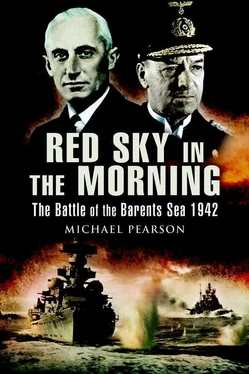• Although US President unable to lend twelve destroyers have made arrangements for convoy over thirty ships to sail from Iceland 22 December. Germans have moved bulk of aircraft from North Norway to Southern Europe to counter ‘Torch’. German surface forces in Norway still on guard.
• Shipping is limiting factor. To do ‘Torch’ we had to cut transatlantic escorts so fine that first half of November was worst month so far. UK and US budgeted to lose 700,000 tons per month and still improve margin. Over the year average losses are not quite so bad, but first fortnight in November was worse. [21] 20 PRO. PREM 3/393.
Given the task of arranging the defence of the convoy Admiral Tovey proposed a change from the usual method to take into account, and take advantage of, the Arctic winter:
From late November to mid January the lack of daylight is such that air reconnaissance in the Arctic is virtually impossible. Provided that a convoy is of such a size that it can be handled and kept together, it therefore stands an excellent chance of evading both U-boat and surface attack and even of completing the passage without the enemy’s knowing of its existence. A large convoy, on the other hand, is likely to fail to keep company, and to split (as did QP15 ) into a large number of small groups, covering a vast area and unaware of each other’s position or composition. Such small groups would be more liable to detection by U-boats than a single concentrated convoy and would present the enemy surface forces with an ideal opportunity for an offensive sweep. Our own covering forces are always handicapped by having to identify a contact before they are free to attack; the enemy need not do so. The splitting of the convoy into a large number of scattered units would greatly add to this handicap. [22] 21 PRO. ADM 234/369.
The Admiral’s contention that greater control could be exercised over smaller convoys was accepted and it was decided that the thirty-ship convoy for December would be run in two fifteen-ship sections. It was also decided to drop the PQ prefix in favour of JW ; while for return convoys RA replaced QP .
—♦—
From the last quarter of 1941, the supply of fuel oil for the German navy had been critical. By April 1942 deliveries from Romania had fallen from 46,000 tons (46,736 tonnes) to 8000 tons (8128 tonnes) per month, and this was promised to the Italians for their campaign to keep the Mediterranean open to Axis shipping. [23] 22 Ibid.
Such shortages did not, however, affect the submarines or pocket battleships, which burned diesel oil – still in comparatively plentiful supply. On the afternoon of 19 November 1942, at one of his regular meetings with Hitler, Grand Admiral Raeder again drew the Führer ’s attention to the problem and received orders to return Lützow to Norway in view of her diesel-burning engines. Raeder also primed Hitler for the use of surface units by pointing out that while there were presently twenty-three submarines assigned to the Arctic, of which ten were in operational zones, during the months of almost perpetual night, submarine operations would be much less effective due to the absence of aerial reconnaissance and adverse weather conditions. [24] 23 PRO. ADM 116/5307.
On the surface, with good visibility a U-boat could spot a convoy’s smoke 30–40 miles (55–74 km), away, while in bad visibility prospects for making contact would be cut to 20 miles (37 km) with the use of hydrophones. [25] 24 AHB/II/117/3(B), p. 270–1, quoted in Terraine, John (1997) The Right of the Line , Wordsworth Editions.
Second World War submarines could spend a comparatively limited time submerged owing to the need to recharge batteries and replenish their oxygen supply, a significant problem in the storms and blizzards of the Arctic winter. As a result of these considerations, and the fact that in the early years of the war detection equipment could only identify a submarine under water, the U-boats’ favoured method of attack was at night on the surface. This approach was not best suited to the violent weather of the Arctic winter.
Raeder followed up his intention to use surface vessels by authorising Admiral Commanding Cruisers, Vice-Admiral Oskar Kummetz, to devise a plan to be put into action at the next opportunity.
—♦—
While the political leadership and the generals and admirals conducted their grand strategy, for the men of all sides who fought in the Arctic there were two enemies – their human foe, and the weather. Often the latter would prove to be the more unforgiving, an enemy not only uncomfortable and inconvenient but packing a heavy punch.
‘What was life like in the Arctic in destroyers?’ I asked Lieutenant-Commander John Patrick ‘Paddy’ Donovan, MBE, RN.
‘Bloody!’ was his pithy comment.
Paddy Donovan was born in Weymouth, Dorset, in 1919, into a naval family – both grandfathers had been in the Navy, as had his father and three uncles. During the Second World War his elder sister Kathleen became a WREN petty officer and his younger brother Tim also followed him into the ranks, but tragically went down with the battlecruiser Repulse in December 1941. His elder brother Mick had also been earmarked for the senior service but he was thrown from a horse while helping the local milk lady, and the accident affected his sight and hearing. Only one other Donovan seems to have been able to resist the siren call of the Navy – younger sister Connie became a WAAF mechanic.
Paddy Donovan saw service in battleships in the 1930s, and the cruiser Norfolk during the Abyssinian crisis of 1939, and survived the loss of the fast minelayer Latona in 1941, bombed and sunk while attempting to run supplies into besieged Tobruk. In the latter part of 1942 the then Second Lieutenant Donovan joined the new Royal Navy destroyer Obedient as gunnery officer. One of the first of the Navy’s new class of escort destroyers, the ship was assigned to Arctic convoy protection, and Paddy needed to acclimatise himself quickly to the particular difficulties and dangers of serving in those far northern latitudes.
The waters of the Barents Sea need to be treated with utmost respect in peacetime, let alone in war. Sub-zero winds blast off the polar ice cap at up to hurricane strength, catching and freezing spray and rain, blowing it like shrapnel against a ship’s upper works to set as layer upon layer of ice. This ice must be regularly chipped or steam-hosed away if the weight is not to cause stability problems and the serious risk of foundering. Ships take waves 70 ft (21.3 m) high ‘green’ over their decks, while in the depths of winter temperatures might register 50 degrees Celsius of frost. Any crewman unwise enough to go on deck in these conditions without gloves would find the flesh of his hand instantly ‘welded’ to metal by frost, should he touch it. On 17 January 1942 the escort destroyer Matabele was torpedoed in these treacherous waters and sank. A rescue vessel arrived on the scene in minutes but found only two survivors, the rest of the crew having frozen to death. To add to the difficulties, the warmer waters of the Gulf Stream enter the freezing Arctic, causing banks of thick fog to drift across the area, and the phenomenon known as ‘layering’ (different layers of warm and cold water), which was little understood at the time, but which seriously disrupted ASDIC [26] b Anti-submarine detection equipment developed between the wars by the Anglo-French Allied Submarine Detection Investigation Committee.
searches for submarines.
Читать дальше












